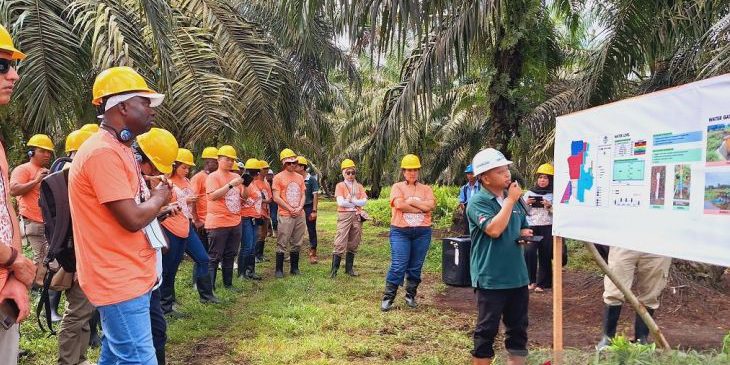PT Kimia Tirta Utama (PT KTU), a subsidiary of Astra Agro operating in Koto Gasib, Siak Regency, hosted a training on sustainable palm oil commodities.
The visit at PT KTU was part of a long series of training held from June 22 to July 2, 2024, organized by the Directorate General of Americas and Europe, Bogor Agricultural University (IPB), and the International Development Cooperation Fund Institute (LDKPI), Ministry of Finance.
“The information and knowledge gained directly from these palm oil plantations is very important,” Lucas Nardy de Vasconcelos Leitao told the media at the visit site. Especially, according to the participant from the Brazilian Ministry of Foreign Affairs, the visit results were important for him to share in his country which also has the potential of the palm oil industry.
Lucas admitted that after participating in the capacity-building program, he wanted to share his experience and develop the insights of palm oil plantation players in Brazil. He said the visit to the palm oil plantation in Riau was excellent. From here, according to him, it can be material for comparison and evaluation of oil palm plantations in his country.
As stated by Expert Staff of the Ministry of Foreign Affairs, Adam Mulawarman Tugio, this activity is also related to socialization so that many parties can better understand the palm oil industry. So far, many parties abroad have restricted coconut exports due to the misconception that palm oil management is not done sustainably.
With the support of participating countries, which are also commodity exporters, it is hoped that sustainable policies can be implemented more widely.
“This opportunity is a good thing for all of us, they can learn whether this can be applied in their respective countries. That way we also have more friends when there are discussions of this issue in international forums,” he said.
At PT KTU, the participants were invited to see firsthand the practices of sustainable palm oil management. The participants were invited to visit conservation areas and PT KTU’s factory. All participants, who came from various backgrounds, such as researchers, policymakers, business people, and diplomats, were seen seriously following and paying attention to the explanations given by the PT KTU team.
During the observation, participants were given the opportunity to ask questions, especially regarding water management in peatlands as well as mechanisms, equipment and anticipation of forest and land fires (karhutla).
Similar to the participants’ enthusiasm and desire to share their knowledge with their respective countries, Endro Prastowo, Astra Agro’s Riau Area Operations Director, also hoped that the information and sustainable practices obtained from PT KTU could be an inspiration. “We hope that with this activity, participants can learn the practice of sustainable oil palm plantation management and convey this information when they return to their respective countries,” he said.
Moreover, according to Endro, oil palm is a commodity that has high economic value and has a positive impact on society and the environment.
Source: Antaranews.com
Disclaimer
This article may contain copyrighted material, the use of which may not have been pre-authorized by the copyright owner. This material is made available for the purpose of giving information and knowledge. The material contained on the Astra Agro website distributed without profit. If you are interested in using copyrighted material from this material for any reason that goes beyond ‘fair use’, you must first obtain permission from the original source










